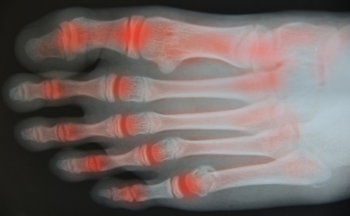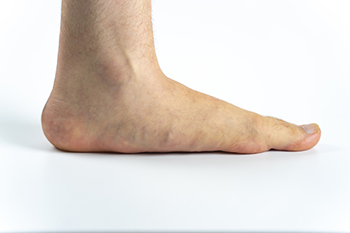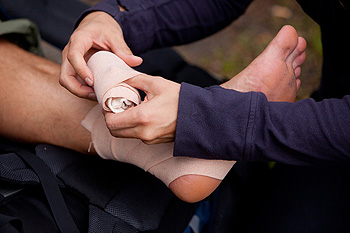Items filtered by date: November 2021
What Is Osteoarthritis?
 Osteoarthritis is a common joint disease that is caused by degeneration of cartilage, a layer of tissue that lines the ends of bones and helps them move smoothly. When the cartilage is worn away, the bones begin to rub directly against each other as they move, leading to pain, swelling, and joint stiffness. Osteoarthritis often affects the joints in the feet and ankles. In addition to the symptoms of arthritis itself, this condition can also cause other foot problems, such as bunions, hallux rigidus, and corns and calluses. Osteoarthritis is associated with aging and tends to affect people over age 45. People who are overweight or obese, have a family history of osteoarthritis, or have a medical history of rheumatoid arthritis or gout are most at risk. If you are experiencing symptoms of osteoarthritis in your feet or ankles, please consult with a podiatrist.
Osteoarthritis is a common joint disease that is caused by degeneration of cartilage, a layer of tissue that lines the ends of bones and helps them move smoothly. When the cartilage is worn away, the bones begin to rub directly against each other as they move, leading to pain, swelling, and joint stiffness. Osteoarthritis often affects the joints in the feet and ankles. In addition to the symptoms of arthritis itself, this condition can also cause other foot problems, such as bunions, hallux rigidus, and corns and calluses. Osteoarthritis is associated with aging and tends to affect people over age 45. People who are overweight or obese, have a family history of osteoarthritis, or have a medical history of rheumatoid arthritis or gout are most at risk. If you are experiencing symptoms of osteoarthritis in your feet or ankles, please consult with a podiatrist.
Arthritis can be a difficult condition to live with. If you are seeking treatment, contact one of our podiatrists from Parkwood Podiatry. Our doctors can provide the care you need to keep you pain-free and on your feet.
Arthritic Foot Care
Arthritis is a term that is commonly used to describe joint pain. The condition itself can occur to anyone of any age, race, or gender, and there are over 100 types of it. Nevertheless, arthritis is more commonly found in women compared to men, and it is also more prevalent in those who are overweight. The causes of arthritis vary depending on which type of arthritis you have. Osteoarthritis for example, is often caused by injury, while rheumatoid arthritis is caused by a misdirected immune system.
Symptoms
- Swelling
- Pain
- Stiffness
- Decreased Range of Motion
Arthritic symptoms range in severity, and they may come and go. Some symptoms stay the same for several years but could potentially get worse with time. Severe cases of arthritis can prevent its sufferers from performing daily activities and make walking difficult.
Risk Factors
- Occupation – Occupations requiring repetitive knee movements have been linked to osteoarthritis
- Obesity – Excess weight can contribute to osteoarthritis development
- Infection – Microbial agents can infect the joints and trigger arthritis
- Joint Injuries – Damage to joints may lead to osteoarthritis
- Age – Risk increases with age
- Gender –Most types are more common in women
- Genetics – Arthritis can be hereditary
If you suspect your arthritis is affecting your feet, it is crucial that you see a podiatrist immediately. Your doctor will be able to address your specific case and help you decide which treatment method is best for you.
If you have any questions, please feel free to contact our offices located in Brunswick and Hinesville, GA . We offer the newest diagnostic and treatment technologies for all your foot care needs.
Why Do I Have Plantar Fasciitis?
Plantar fasciitis, the inflammation of the ligament that runs along the bottom of the foot and connects the toes to the heel bone, is a common cause of heel pain. When the plantar fascia is injured through repetitive strain, excessive exercise, prolonged standing, wearing uncomfortable shoes, or obesity, it may lead to stabbing heel pain that is typically at its worst when taking the first few steps after a long rest. Other possible causes of plantar fasciitis include structural abnormalities in the foot, such as having flat feet, high arches, overpronation, or leg length differences. Foot changes associated with aging or pregnancy may also be to blame in some cases. If you are suffering from heel pain, don’t hesitate to schedule an appointment with a podiatrist near you.
Plantar fasciitis is a common foot condition that is often caused by a strain injury. If you are experiencing heel pain or symptoms of plantar fasciitis, contact one of our podiatrists from Parkwood Podiatry. Our doctors can provide the care you need to keep you pain-free and on your feet.
What Is Plantar Fasciitis?
Plantar fasciitis is one of the most common causes of heel pain. The plantar fascia is a ligament that connects your heel to the front of your foot. When this ligament becomes inflamed, plantar fasciitis is the result. If you have plantar fasciitis you will have a stabbing pain that usually occurs with your first steps in the morning. As the day progresses and you walk around more, this pain will start to disappear, but it will return after long periods of standing or sitting.
What Causes Plantar Fasciitis?
- Excessive running
- Having high arches in your feet
- Other foot issues such as flat feet
- Pregnancy (due to the sudden weight gain)
- Being on your feet very often
There are some risk factors that may make you more likely to develop plantar fasciitis compared to others. The condition most commonly affects adults between the ages of 40 and 60. It also tends to affect people who are obese because the extra pounds result in extra stress being placed on the plantar fascia.
Prevention
- Take good care of your feet – Wear shoes that have good arch support and heel cushioning.
- Maintain a healthy weight
- If you are a runner, alternate running with other sports that won’t cause heel pain
There are a variety of treatment options available for plantar fasciitis along with the pain that accompanies it. Additionally, physical therapy is a very important component in the treatment process. It is important that you meet with your podiatrist to determine which treatment option is best for you.
If you have any questions, please feel free to contact our offices located in Brunswick and Hinesville, GA . We offer the newest diagnostic and treatment technologies for all your foot care needs.
Do I Need to See a Podiatrist for Flat Feet?
 When the feet are pressed flat while standing, this can often be a result of the condition known as flat feet or fallen arches. Usually, flat feet are not serious and do not need treatment. They should not interfere with your daily physical activities either. However, in more serious cases, patients with flat feet should consult with a podiatrist. Common reasons a podiatrist should be consulted include flat feet that are painful, stiff, or weak. Patients who have flat feet and often injure their feet or ankles, have a balance problem, or have only one foot that is affected, should consult with a podiatrist as well. For certain cases of flat feet, surgery may be necessary, but in most cases, a podiatrist will be able to suggest proper footwear and exercises in order to treat this condition.
When the feet are pressed flat while standing, this can often be a result of the condition known as flat feet or fallen arches. Usually, flat feet are not serious and do not need treatment. They should not interfere with your daily physical activities either. However, in more serious cases, patients with flat feet should consult with a podiatrist. Common reasons a podiatrist should be consulted include flat feet that are painful, stiff, or weak. Patients who have flat feet and often injure their feet or ankles, have a balance problem, or have only one foot that is affected, should consult with a podiatrist as well. For certain cases of flat feet, surgery may be necessary, but in most cases, a podiatrist will be able to suggest proper footwear and exercises in order to treat this condition.
Flatfoot is a condition many people suffer from. If you have flat feet, contact one of our podiatrists from Parkwood Podiatry. Our doctors will treat your foot and ankle needs.
What Are Flat Feet?
Flatfoot is a condition in which the arch of the foot is depressed and the sole of the foot is almost completely in contact with the ground. About 20-30% of the population generally has flat feet because their arches never formed during growth.
Conditions & Problems:
Having flat feet makes it difficult to run or walk because of the stress placed on the ankles.
Alignment – The general alignment of your legs can be disrupted, because the ankles move inward which can cause major discomfort.
Knees – If you have complications with your knees, flat feet can be a contributor to arthritis in that area.
Symptoms
- Pain around the heel or arch area
- Trouble standing on the tip toe
- Swelling around the inside of the ankle
- Flat look to one or both feet
- Having your shoes feel uneven when worn
Treatment
If you are experiencing pain and stress on the foot you may weaken the posterior tibial tendon, which runs around the inside of the ankle.
If you have any questions please feel free to contact our offices located in Brunswick and Hinesville, GA . We offer the newest diagnostic and treatment technologies for all your foot and ankle needs.
How to Care For an Ankle Sprain After Leaving the Doctor’s Office
If you have sprained your ankle it is very important to seek the care of a podiatrist who can diagnose and treat your injury. But treatment does not begin and end at the doctor’s office. There are many things that you may need to do at home to ensure that your ankle heals properly. You should try to keep weight off of your injured ankle by keeping it elevated by propping it up on a pillow in order to reduce swelling. Put ice on your injured ankle periodically for three days following your injury to control swelling. Take any pain medications and wear splints, braces, or other orthotics as prescribed. For more information about caring for a sprained ankle, please consult with your podiatrist.
Ankle sprains are common but need immediate attention. If you need your feet checked, contact one of our podiatrists from Parkwood Podiatry. Our doctors can provide the care you need to keep you pain-free and on your feet.
How Does an Ankle Sprain Occur?
Ankle sprains take place when the ligaments in your ankle are torn or stretched beyond their limits. There are multiple ways that the ankle can become injured, including twisting or rolling over onto your ankle, putting undue stress on it, or causing trauma to the ankle itself.
What Are the Symptoms?
- Mild to moderate bruising
- Limited mobility
- Swelling
- Discoloration of the skin (depending on severity)
Preventing a Sprain
- Wearing appropriate shoes for the occasion
- Stretching before exercises and sports
- Knowing your limits
Treatment of a Sprain
Treatment of a sprain depends on the severity. Many times, people are told to rest and remain off their feet completely, while others are given an air cast. If the sprain is very severe, surgery may be required.
If you have suffered an ankle sprain previously, you may want to consider additional support such as a brace and regular exercises to strengthen the ankle.
If you have any questions please feel free to contact our offices located in Brunswick and Hinesville, GA . We offer the newest diagnostic and treatment technologies for all your foot and ankle needs.
Causes of Achilles Tendonitis
 When the Achilles tendon, which is the large tendon on the back of the ankle connecting the calf to the heel bone, becomes inflamed, Achilles tendonitis occurs. Achilles tendonitis may not come from any particular trauma, but instead, the pain gradually worsens over time. Most of the time, pain from Achilles tendonitis is worse in the morning and after long periods of rest, and the pain lessens throughout the day. The most common cause of Achilles tendonitis is over-pronation which is when the arch of the foot flattens upon bearing weight and puts stress on the tendon. Other factors that can lead to Achilles tendonitis include poorly fitting shoes, poor stretching, trauma or a shortened tendon. Patients who are experiencing symptoms of Achilles tendonitis should consult a podiatrist, because it can eventually lead to a painful rupture of the tendon.
When the Achilles tendon, which is the large tendon on the back of the ankle connecting the calf to the heel bone, becomes inflamed, Achilles tendonitis occurs. Achilles tendonitis may not come from any particular trauma, but instead, the pain gradually worsens over time. Most of the time, pain from Achilles tendonitis is worse in the morning and after long periods of rest, and the pain lessens throughout the day. The most common cause of Achilles tendonitis is over-pronation which is when the arch of the foot flattens upon bearing weight and puts stress on the tendon. Other factors that can lead to Achilles tendonitis include poorly fitting shoes, poor stretching, trauma or a shortened tendon. Patients who are experiencing symptoms of Achilles tendonitis should consult a podiatrist, because it can eventually lead to a painful rupture of the tendon.
Achilles tendon injuries need immediate attention to avoid future complications. If you have any concerns, contact one of our podiatrists of Parkwood Podiatry. Our doctors can provide the care you need to keep you pain-free and on your feet.
What Is the Achilles Tendon?
The Achilles tendon is a tendon that connects the lower leg muscles and calf to the heel of the foot. It is the strongest tendon in the human body and is essential for making movement possible. Because this tendon is such an integral part of the body, any injuries to it can create immense difficulties and should immediately be presented to a doctor.
What Are the Symptoms of an Achilles Tendon Injury?
There are various types of injuries that can affect the Achilles tendon. The two most common injuries are Achilles tendinitis and ruptures of the tendon.
Achilles Tendinitis Symptoms
- Inflammation
- Dull to severe pain
- Increased blood flow to the tendon
- Thickening of the tendon
Rupture Symptoms
- Extreme pain and swelling in the foot
- Total immobility
Treatment and Prevention
Achilles tendon injuries are diagnosed by a thorough physical evaluation, which can include an MRI. Treatment involves rest, physical therapy, and in some cases, surgery. However, various preventative measures can be taken to avoid these injuries, such as:
- Thorough stretching of the tendon before and after exercise
- Strengthening exercises like calf raises, squats, leg curls, leg extensions, leg raises, lunges, and leg presses
If you have any questions please feel free to contact our offices located in Brunswick and Hinesville, GA . We offer the newest diagnostic tools and technology to treat your foot and ankle needs.


